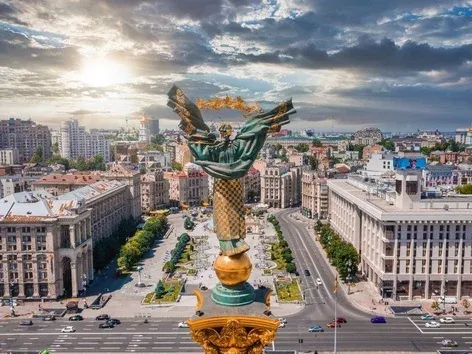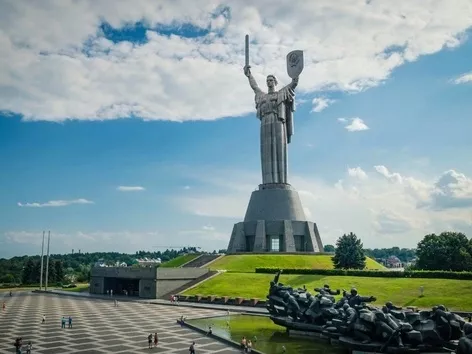How Ukraine prepared for the declaration of independence as part of the USSR: the adoption of the Declaration of Sovereignty of Ukraine

On 16 July, Ukrainians celebrate the Day of Adoption of the Declaration of Sovereignty of Ukraine. Find out more about the process of approving one of the most important documents for the state in 1990 and why this date is considered the "eve" of Ukrainian independence
33 years ago, Ukraine and its people took a stride towards independence. The Verkhovna Rada of the Ukrainian Soviet Socialist Republic approved the Declaration on State Sovereignty, starting the constitutional process and establishing independence.
For the second year now, Ukraine celebrates this day in wartime, and the terrible reality forces us to remember what every Ukrainian is fighting for at the frontline and in the rear. We invite you to learn more about the eve of Ukrainian independence and its historical significance.
The Trend Towards Sovereignty
In 1990, embracing sovereignty was a trend among the Soviet republics, with the parliaments of many countries discussing this topic. This movement was named the Parade of Sovereignties, and it led to the fact that republics established the supremacy of their legislation over the all-Union laws.
Demonstration on the day the Declaration was adopted
The political landscape of the time also affected the moscow establishment, resulting in declaring State Sovereignty of the russian socialist republic. Such a decision was supposed to change the allocation of powers from the political center directly to the republic. However, this attempt did not achieve the desired effect, as the republics began to regain their independence.
The declaration of sovereignty became the initial stage of the republics’ exit from the Soviet Union. Lithuania was the first to regain independence, followed by Latvia and Estonia. These decisive actions pushed Ukrainian politicians to act.
The Day of the Declaration of Ukraine's Sovereignty
On July 16, 1990, deputies of the Verkhovna Rada of Ukraine voted to adopt the Declaration. This document was supported by the majority, although almost all provisions contradicted the current Constitution of the Ukrainian SSR.
The adoption of the document was preceded by a series of important events. In particular, the elections to the Verkhovna Rada of the Ukrainian SSR held in spring played a pivotal role. For the first time, a democratically oriented opposition gained a quarter of the mandates and thereby destroyed the communist monopoly on power.
The idea to officially change the principles of coexistence within the USSR belonged to the opposition movement called the People's Council (Narodna Rada). However, the communists resisted accepting sovereignty and changed the document’s text. They even wanted to form a joint military force with russia, to keep the Republic’s name and the Soviet passport.
In the summer of 1990, the parliament created favorable conditions for the adoption of the Declaration. The opposition gained political momentum, with the leader of the communists, Volodymyr Ivashko, drafting a mandate that demoralized the communists.
As a result, on July 16, 1990, the Verkhovna Rada represented the will of the Ukrainian people and approved the Declaration. The vote count stood at 355 deputies for, 4 against, and 1 deputy abstaining.
The session of the Verkhovna Rada, which approved the Declaration
Visit Ukraine on social media: Telegram | YouTube | Instagram | Facebook | Twitter | TikTok
The Main Principles of the Declaration
The road to this historic day was thorny but it yielded fruitful results. Through relentless efforts, the authorities of Ukraine adopted a document that proclaimed the supremacy, independence, completeness, and indivisibility of the republic’s power within its territory, independence, and equality in external relations.
The text of the document was a cornerstone for Ukraine's political course, its independence in economic, scientific, educational, and cultural activities. The Declaration established the following key principles:
● The people are the source of power in Ukraine;
● Ukraine has its own citizenship;
● All citizens are equal before the law;
● Economic independence of the country, namely the intention to create its banking, tax, customs systems, its own currency, and state budget;
● Ukraine's ability to conduct foreign relations: sign international agreements, exchange consular and diplomatic missions;
● Military neutrality and commitment not to use and produce nuclear weapons;
● Separation of powers into three branches: executive, legislative, and judicial.
The provisions of the Declaration were considered the foundation for the primary legislative acts of Ukraine, including the Constitution and various laws.
Declaration of state sovereignty
Sovereignty vs Independence
These two concepts go alongside, meaning that independence would not come without the acceptance of sovereignty. Interestingly, on the day the Declaration was adopted, the deputies accepted the resolution about the day of the declaration of independence of Ukraine. This document marked July 16 as Independence Day to celebrate annually. However, with Ukraine officially gaining independence on August 24, 1991, the celebration date was subsequently changed.
The Motherland Monument is not just a cultural landmark in Ukraine. The pose, facial expression, weapons in the hands, and even the direction the sculpture is facing have a symbolic meaning. Read more about the history of the monument, its sacred role and the importance of the reconstruction here.
You may be interested in:
Visit Ukraine Donation - make a good deed and an important contribution to the Victory of Ukraine;
Visit Ukraine Tours - the largest online database of tours to Ukraine for every taste;
Visit Ukraine Merch - choose patriotic clothing and accessories with worldwide delivery;
Visit Ukraine News - get the latest news and updates in our Telegram channel;
Cooperation - cooperation and advertising integrations with Visit Ukraine and Visit World projects.
Recommended articles
3 min
Kultur
The Motherland Monument is not just a cultural landmark in Ukraine. The pose, facial expression, weapons in the hands, and even the direction the sculpture is facing have symbolic meaning. Find out more about the monument's history, sacred role, and the importance of the reconstruction
14 Jul. 2023
More details2 min
Beliebt
129 years ago, on July 14, 1894, Ukraine played its first football match. Learn more about the history of Ukrainian football and how the Ukrainian youth team won a ticket to the 2024 Olympic Games for the first time
14 Jul. 2023
More details3 min
Reisen
What's unusual to visit in Ukraine: top 6 most amazing museums
There are more than 5,000 different museums in Ukraine. Some of them are able to impress even those tourists who are convinced that they have already seen everything. Find out more about the most unusual museums in Ukraine
15 Jul. 2023
More details2 min
Kultur
7 Ukrainian artists whose achievements and works are presented by russia as their own
For many centuries, russia has been trying to destroy Ukraine's history and culture, while appropriating a large number of works of art and the individuals who created them. Learn more about the Ukrainian artists whom russia has russified and passed off as its own
16 Jul. 2023
More details

